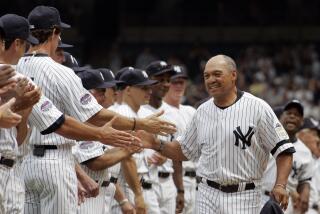He Is Not Going Gentle Into October of Career
BALTIMORE — Do not go gentle into that good night . . .
But rage, rage against the dying of the light.
--DYLAN THOMAS
There is the story of the old Indian chief long into the winter of his life whose braves ask him if there is anything more he wishes. He sighs.
“Yes,” he says softly. “One more spring.”
Not Reginald Martinez Jackson, another lion in winter. Reggie wants one more October.
He wants the cheers of thousands in a bunting-festooned ballpark one more time. He wants a fastball down the gut with the runners on base and going and the game on the line. He wants the scoreboard lit up with “R-e-g-g-i-e!” He wants the bleachers standing. He wants to put one more World Series ball into orbit, he wants to go into one more home-run trot, posting around the bases like a man leaning into a strong wind. He wants to raise his fist in the air one more time in triumph to defy the fates that decree that a man outlives his strengths and has only memories and faded dreams at the last.
Reggie is not going gently into that good night.
Reggie calls impromptu press conferences and rails against the things that are happening to him, the things that happen to any man when the lights get dimmer, the fastballs faster, the curveballs sharper, the pitchers younger and the world uncaring.
Someone is to blame for this state of affairs, not Reggie. He taps his stomach, as flat and hard as it was when he was a two-letterman at Arizona State. He is as good as he ever was for that one big at-bat, that one important game, he insists, and if the Angels don’t know it, Reggie does.
They name ballplayers after trains, animals, hometowns, prairies or rivers. Reggie gets a whole month. They named him after October because that’s when he lights up like the biggest sign on Broadway.
It’s the money month in baseball and it belongs to Reggie. Some guys get a candy bar, an automobile, a school named after them, Reggie gets 31 days. October is when the leaves turn, the ground gets hard, the moon gets yellow--and Reggie shines.
It’s hard to leave all that. Some guys don’t want to. Some guys don’t want to hear the bell tolling. Reggie is one of them.
Reggie knows the world is trying to walk him to the door. And he doesn’t want to go yet. The party’s not over, the lights are not out, the music is still playing.
They found a new role for Reggie this year. They thought maybe he could prolong his career if he turned into Wee Willie Keeler, the hunt-and-peck hitter. Reggie, too, always hit-’em-where-they-ain’t. Only in Reggie’s case, this was the center-field bleachers, not the gaps on the ground between third and short.
Reggie despised the part, anyway. Reggie felt like the captain of an aircraft carrier plying the waters of a tidal creek carrying a cargo of fudge.
Imagine Mr. October with a check swing to the opposite field, bunting for a hit, probing for an opening? It was like a German general selling pencils, a Cossack on a mule, Spencer Tracy throwing pies, Dempsey jabbing. Reggie is not small arms fire. Reggie is a railroad gun.
There were more home runs where the original 541 came from, felt Reggie, and he went back to his old 380-degree swing where he ends up on one knee and the ball ends up in the next county.
The club was not amused. They wondered whether Reggie might retire his swing and himself along with it while he was at it.
It was Reggie’s turn to be unamused. Reggie was outraged at the effrontery, the lese majeste . It was a classic example of man’s inhumanity to man--or art--like burning Joan of Arc at the stake or taking a hammer to a statue.
Reggie took his case to the highest court in the land--the press. He put the most overheated comments off the record, but there was enough left to singe whatever remained of good labor relations. Reggie did not spare anybody, from the owner to the manager to the whole Establishment.
“They didn’t want me in spring, they didn’t think they needed me,” Reggie said in some pained tones. “I led the team in home runs last year, I tied in RBI’s.”
A lot of guys would expect a ticker-tape parade for those kinds of stats. Reggie gets given his hat and shown the way out. The Angels made it clear he is not in anybody’s plans, and they wish he would take the hint.
Reggie is not bitter, exactly, just hurt. Baseball is good at honoring its ancestry. Its contemporary is something else again.
“I want to go out with dignity,” is the way Reggie puts it. He doesn’t want to go out at the end of someone’s heel.
He wants to go out with the flags flying, the bands playing and the crowds cheering one more time. The man who has hit more home runs than all but 5 of all the players who ever played the game does not want to be put in a boat and cast adrift, or put on a train and told to pick a destination. He has served the game well and deserves better, he feels.
He wants to be honored. He wants another year for his farewell tour. He wants to go out like Bernhardt, not some riffraff.
The question is, by whom? Whom does Reggie Jackson belong to? Is he an Oakland A, where he had his glittering early successes? Is he a New York Yankee, where he became a candy bar? Or is he an Angel?
Should he be a statue in center field in Yankee Stadium? Or is Anaheim his home shrine? What about Baltimore, where he played a season?
Reggie is the athletic version of the man without a country, the sailor without a port. He is the star without a team.
Free agentry has done that, has made players as itinerant as frontier pots and pans peddlers, as free-floating as balloons. The great players don’t stay in one uniform or even one part of the country anymore.
“I know I’m just a hired gun,” Reggie admits. “I know this club doesn’t owe me anything more than a nice clean uniform and a field to play on.”
But a man has to take his final bow. the question is, where? Even though he’s Mr. October, he’s not a man for one season. Reggie’s teams have been in an astonishing 16 post-season playoffs, including 6 World Series, of which they won 5, and he must have been doing something in May, June and July for them to get in them.
Reggie will make Cooperstown, everybody’s home shrine, but that’s five years down the road. His legend should have somewhere to rest in the meantime. No man is an island, least of all Reggie.
That’s why he wants one more pennant to hoist, one more October to light up. “Winning is an art, and I have learned that,” he says. “It takes wisdom and patience as well as talent. I have been there.”
If he can cajole one more October, goes his reasoning, then the Angels will finally get in their World Series and he will have his last hurrah next season, the triumphal procession his soul needs and his career has earned him. Not for Reggie to go out in some dismal National League city like Babe Ruth, hooted and unloved. Reggie wants his curtain call.
Then, he might go gently into that good night. Then, and only then, the night will really be good. And the rage stilled.
More to Read
Go beyond the scoreboard
Get the latest on L.A.'s teams in the daily Sports Report newsletter.
You may occasionally receive promotional content from the Los Angeles Times.





